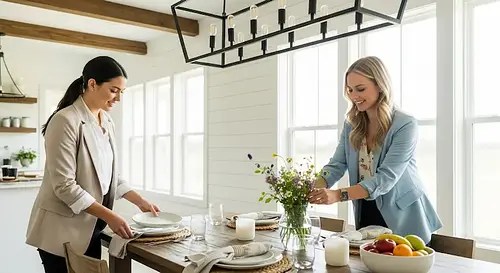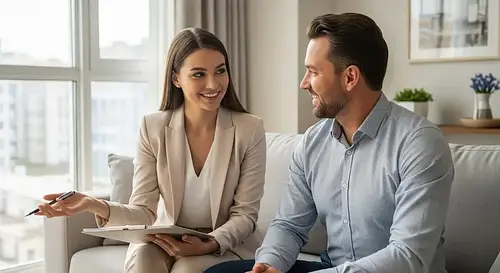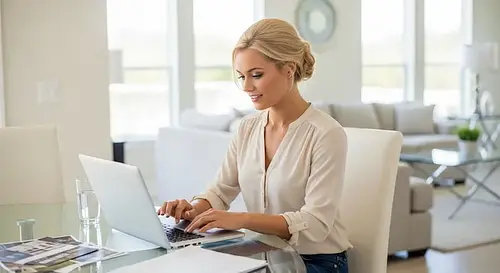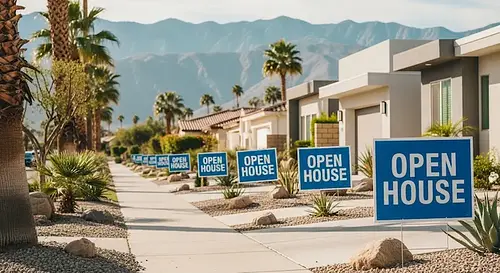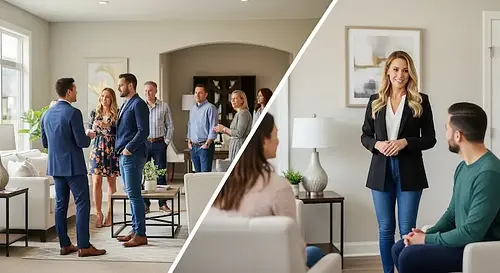Are Open Houses Worth It?
Open houses remain a vital and highly effective strategy for real estate agents in 2025. Far more than just an event for showcasing properties, they offer unparalleled opportunities to generate leads, build meaningful relationships, and establish a strong presence in the community. In this article, we explore how open houses continue to drive success, offering proven tactics for maximizing their impact and addressing common concerns. Whether you're a seasoned agent or just starting, you'll find actionable insights to help you turn every open house into a powerful marketing tool that boosts your business.

Written by Seth Cox
Jun 10, 2025 / Open house marketing
It’s true that only about 5% of homes sell directly as a result of an open house. But as any seasoned agent will tell you, the real magic happens behind the scenes. While offers may not always come through the door on Sunday afternoon, you’re meeting neighbors, building your sphere, and planting seeds that often bloom into future listings and referrals.
Today’s open houses look a lot different than they did even five years ago. We’re swapping paper sign-in sheets for QR-code check-ins and automating follow-up texts and emails so no lead slips through the cracks. When you measure every visitor’s long-term value, you’ll see the true return on your effort far outweighs the cost of refreshments and flyers.
In the sections ahead, I’ll share the latest market data, walk you through a clear cost-vs-ROI breakdown, and highlight real-world examples from agents who have turned open houses into powerhouse lead-generation events. Whether you’re new to hosting or you’ve been doing it for years, you’ll come away with practical tactics to maximize every showing.

The Purpose of Open Houses: More Than Just Selling Homes
In addition to showcasing a property, open houses offer the perfect opportunity to connect with buyers who may not be ready to make an offer yet. It’s about creating an experience that builds trust and positions you as a professional who’s genuinely interested in helping clients make informed decisions. These connections are what ultimately translate into future listings, referrals, and loyal clients.
Building Relationships with Potential Clients
- Meet potential clients who might not be ready to buy today but will need an agent in the future.
- Connect with neighbors who are thinking about selling or who know someone who is.
- Build rapport with buyers by answering their questions and providing helpful advice on the local market.
Creating Brand Exposure and Community Presence
- Become known as the “go-to” agent in your neighborhood.
- Increase visibility and recognition in the local market.
- Position yourself as a knowledgeable and trustworthy expert, not just someone trying to sell homes.
Leveraging Open Houses for Long-Term Business Growth
Gather contact information from visitors and nurture them as future leads.
- Stay in touch with open house visitors through automated follow-ups (using tools like Showable) to convert them into long-term clients.
- Build a reputation for being approachable, knowledgeable, and genuinely interested in helping clients find their perfect home.

Why Open Houses Are Still Effective
The key to success with open houses lies in treating them as an opportunity to connect with buyers, sellers, and your local community, rather than just a transactional event. With the right tools and strategies, open houses can provide invaluable face-to-face connections and lay the foundation for future opportunities.
The Power of Face-to-Face Connections
While digital marketing and online listings have transformed the industry, nothing can replace the power of personal interaction. Open houses allow you to meet buyers in person, giving you a chance to engage with them directly and build rapport. These interactions can create a lasting impression that makes you their trusted agent when they’re ready to buy or sell.
- Buyers have a chance to ask questions and get immediate, personalized responses.
- It’s easier to build trust when you can interact face-to-face and showcase your knowledge.
- Buyers feel more comfortable making decisions when they can engage with an agent in person, especially in today’s market where personal touch matters.
Building Your Local Brand and Reputation
- Open houses let you showcase your expertise in front of potential clients, making you the go-to agent when they’re ready to buy or sell.
- Regular open houses help you stand out from other agents who may not be as active in the community.
- By hosting open houses, you demonstrate that you're not just trying to sell a home—you're committed to providing value to your community.
Creating Long-Term Business Opportunities
- Open houses allow you to build a strong lead pipeline by capturing contact information and following up with visitors.
- Neighbors who attend might be considering selling their own property in the future.
- Visitors may not be ready to buy now, but your professional handling of the open house could lead to future referrals.

How to Make Your Open House Worth It
From creating buzz on social media to using tools like Showable to track and follow up with leads, there are several ways to enhance your open house experience for both you and your visitors.
Maximize Your Promotion Efforts
- Promote on multiple platforms: Use Facebook, Instagram, local community groups, and real estate websites to advertise.
- Create eye-catching visuals: Share high-quality photos and videos of the property to build excitement.
- Leverage event pages: Create a Facebook event or post on local listing platforms to give potential buyers a way to RSVP and share with others.
Capture Every Lead with Modern Technology
- Use QR codes to digitally capture visitor information and automatically store it in your CRM.
- With tools like Showable, you can instantly follow up with leads after the open house, nurturing them until they’re ready to make a move.
- Segment your leads based on interest level, making it easier to tailor your follow-up communication.
Perfect Your Follow-Up Process
- Send a personalized thank-you note or email within 24 hours of the event.
- Use a follow-up email sequence to stay top-of-mind, offering additional information about the property or local market.
- Consider offering exclusive content, like a neighborhood guide or market trends report, as a value-add to continue the conversation.

Pros and Cons of Hosting Open Houses
The Benefits of Open Houses
- Exposure for the Property: Open houses help showcase a listing to a wider audience, including those who might not otherwise schedule a private showing.
- Build Client Relationships: Meeting potential buyers in person allows you to establish rapport and gain their trust, which can lead to future business.
- Networking Opportunities: Neighbors and other agents often attend open houses, providing opportunities to expand your network and find future listings or referrals.
- Low-Cost Marketing: Compared to other marketing methods like paid ads, hosting an open house is a relatively low-cost way to attract attention to a property.
Challenges of Open Houses
- Time and Effort: Hosting an open house requires time, from preparation to the actual event. You’ll need to ensure the property is properly staged, promotional materials are ready, and you're fully present for visitors.
- Unqualified Visitors: Not everyone who shows up will be a serious buyer. It’s important to qualify visitors quickly and focus on engaging those who are most likely to make a purchase.
- Security Concerns: Open houses can attract people who may not have the best intentions. It’s important to take precautions to safeguard the property and ensure your personal safety during the event.
- No Guarantees: While open houses can generate leads, they don’t always result in immediate offers or sales. The results often depend on the property, the market, and the level of promotion leading up to the event.
How to Mitigate the Challenges
- Plan Ahead: Proper preparation is key. Ensure the property is in top condition, create engaging promotional materials, and have a clear plan for interacting with visitors.
- Qualify Visitors Quickly: Use digital sign-ins to gather visitor information and ask key questions to gauge their level of interest.
- Stay Safe: Always have a plan for security, whether it’s a colleague helping out or using technology to monitor activity at the property.
- Set Realistic Expectations: Understand that not every open house will lead to a sale, but each one is an opportunity to build your network and gather leads for future business.

Security Risks: Are Open Houses Dangerous?
Potential Security Risks at Open Houses
- Strangers in the Home: Open houses give anyone access to the property, including individuals who might not have genuine interest in the property. They could be using the event to case the house or look for an opportunity to steal personal items or damage the property.
- Unqualified Visitors: Some people attending may not be serious buyers, and in rare cases, individuals may be attending for reasons unrelated to purchasing a property (such as scouting the home for criminal activities).
- Personal Safety of the Agent: Agents are typically alone during an open house, which can sometimes present risks. Visitors entering the home, especially if there are few others around, can create potentially unsafe situations for the agent.
- Potential for Disputes: Occasionally, you might encounter visitors who feel strongly about pricing, property condition, or other factors. While most open house interactions are friendly, occasionally, these situations can escalate into conflicts that might require intervention.
How to Protect Yourself and the Property
- Use Digital Sign-In Sheets: Instead of relying on paper sign-ins, use QR codes or digital sign-in tools like Showable. This way, you have a record of every visitor and can track who attended for follow-up. These tools also provide an additional layer of accountability.
- Have a Colleague or Assistant: If possible, bring someone with you to the open house. Having another person present provides an extra layer of security and helps with managing larger groups of visitors.
- Limit Access to Certain Areas: Lock off certain areas of the home, especially rooms where valuable or personal items might be stored. For example, secure closets, bedrooms, and home offices that aren’t part of the open house tour.
- Install Security Cameras: If permissible, consider installing temporary security cameras or monitoring systems in common areas of the home. These can deter potential thieves and provide a record if something goes wrong.
- Keep Personal Items Secure: Always ensure that valuables (such as electronics, jewelry, and documents) are out of sight or locked away. Remind the seller to do the same before the open house.
- Stay Aware and Maintain Control: Keep an eye on everyone during the open house. Be aware of where visitors are at all times, and ensure they are accompanied while touring the home. If you’re meeting multiple guests at once, try to keep the flow organized to avoid overcrowding in any particular area.
Best Practices for Handling Safety Concerns
- Set Clear Boundaries: Before opening the doors, establish clear guidelines for visitors. Make sure they know which areas of the property are off-limits and that they should check in with you before leaving.
- Trust Your Instincts: If someone makes you feel uncomfortable or seems out of place, don’t hesitate to ask questions or request additional information. If a situation feels off, it’s okay to trust your gut and either ask the person to leave or contact the appropriate authorities.
- Use a Buddy System: If you’re an agent working solo, ask a colleague or assistant to stop by during the open house or stay in the vicinity. They don’t need to be in the home, but having a backup nearby can help put your mind at ease.
- Keep Contact Info Handy: Always have a contact list for emergencies, including the local police and your brokerage’s security team. If you ever feel unsafe, you should be able to quickly contact someone who can help.
Safety in the Digital Age: Tools and Technology
- Digital Sign-In Platforms: Tools like Showable allow you to capture contact information from visitors and track their interactions during the open house. This adds a layer of accountability and helps you identify who was in the home at any given time.
- Smart Home Security: Consider using smart locks or alarm systems that you can monitor remotely. Many modern systems allow you to lock doors or activate security measures at the touch of a button, even if you're not in the home.
- Surveillance Apps: Use apps that allow you to view security footage in real-time. Many home security systems now have mobile apps that let you keep an eye on open house activities from your phone.

Alternatives to Open Houses: What’s Working Today
In today’s competitive market, the right combination of traditional and digital strategies can lead to even greater success, creating multi-channel exposure that attracts more potential buyers.
Virtual Tours and Video Walkthroughs for Real Estate
- Wider Reach: Virtual tours attract out-of-town or international buyers who may not be able to attend an in-person open house.
- Pre-Qualification: Buyers can explore the property at their own pace, which increases the likelihood of attracting serious attendees to the open house.
- Convenience for Sellers: Virtual tours reduce the need for multiple in-person showings and give potential buyers the ability to evaluate the property before attending an open house.
Targeted Online Marketing and Social Media Campaigns for Open Houses
- Reach Your Ideal Audience: Social media ads allow you to target specific buyer demographics, including first-time homebuyers, investors, and location-based audiences.
- Drive Traffic to Your Open House: Use Facebook Events and Instagram posts to generate buzz and encourage potential buyers to attend your open house.
- Cost-Effective Exposure: Running ads through platforms like Facebook, Instagram, and Google can be more affordable than traditional marketing methods, providing measurable results.
When to Use Alternatives to Open Houses
- Remote or Rural Properties: For properties located in areas with limited foot traffic, virtual tours can bring in buyers from further afield, making your listing accessible to a larger audience.
- Busy Sellers: Sellers who prefer fewer in-person visits can benefit from virtual tours that allow buyers to preview the home before committing to a private showing or attending an open house.
- Hard-to-Sell Properties: If a property is not receiving sufficient interest through traditional open houses, combining online marketing with virtual tours can increase visibility and attract more serious buyers.

Frequently Asked Questions: Open Houses in Real Estate
Are Open Houses Worth It in 2025?
How Long Should an Open House Last?
Do Open Houses Actually Sell Homes?
Are Open Houses Safe for Real Estate Agents?
How Do I Promote an Open House?
How Do I Follow Up After an Open House?
How Do I Handle Low-Quality Leads at an Open House?
Can I Host an Open House Virtually?
How Do I Measure the Success of an Open House?

Final Thoughts: Are Open Houses Worth It?
While open houses may not always lead directly to a sale, their ability to generate leads, provide exposure, and create lasting connections makes them an essential part of any real estate strategy. By pairing open houses with digital tools like Showable for lead capture, automated follow-ups, and virtual tours for wider exposure, agents can enhance the impact of their open houses and ultimately drive more business.
The Bottom Line: Open Houses Still Matter
- Boost visibility and establish your brand in the community.
- Generate leads and build a strong client pipeline for future business.
- Combine traditional methods with digital tools to maximize your ROI.

